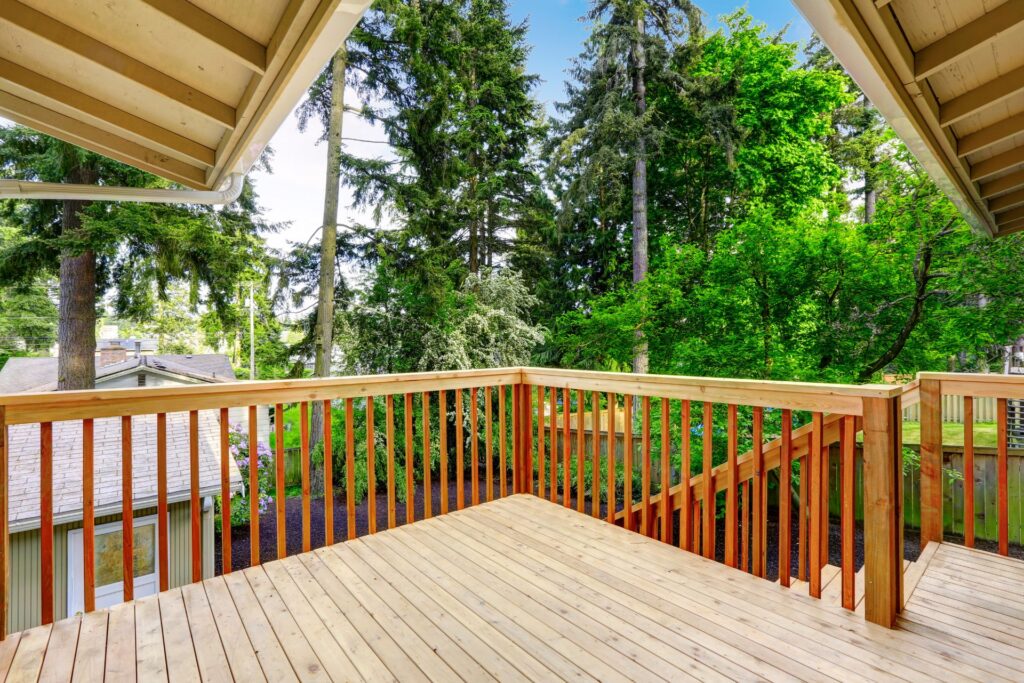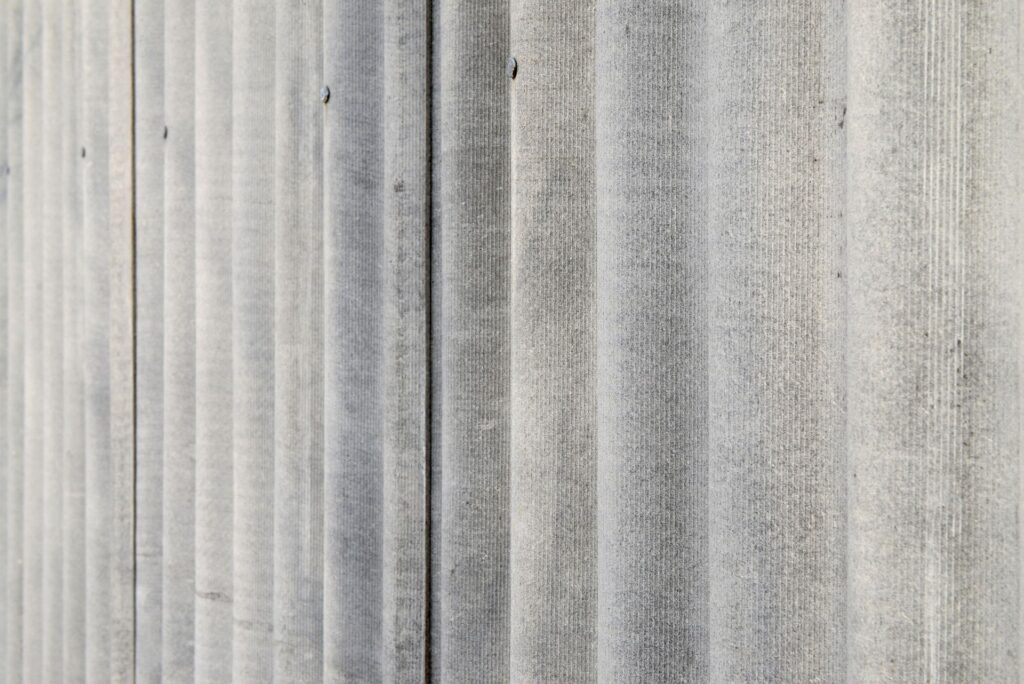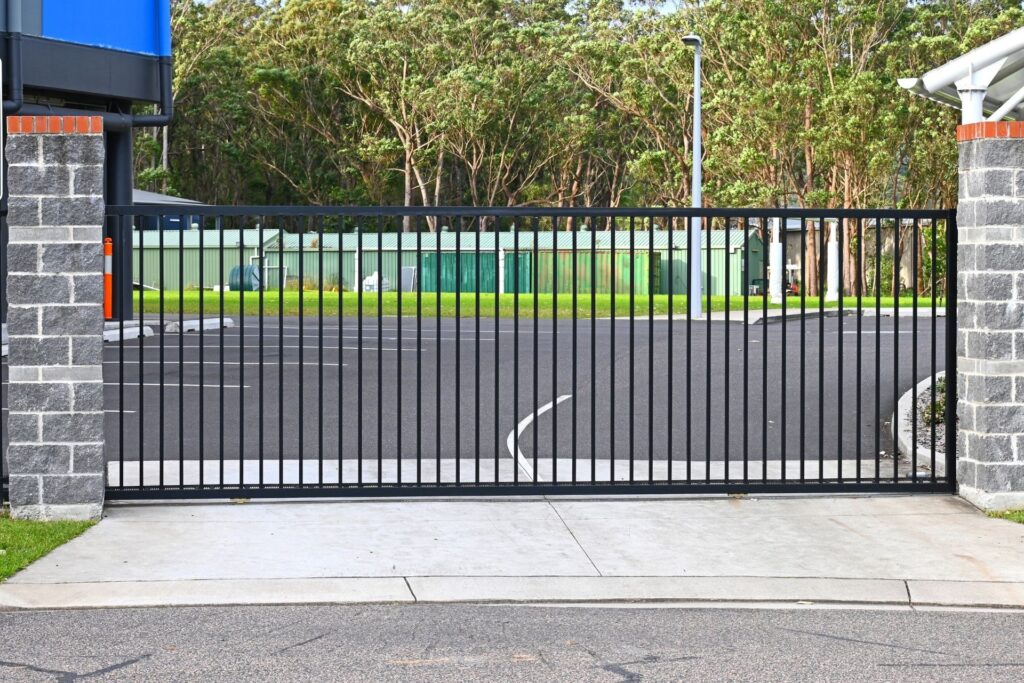Welcome to the ultimate guide on deck construction costs in New Zealand, a comprehensive look into the world of enhancing your outdoor living space. As you embark on this journey to add value and aesthetic appeal to your home, understanding the intricacies of deck costs is paramount. From the choice of materials to the size of your project, and from design complexity to labor expenses, numerous factors will shape your budget. Moreover, local regulations and permits play a crucial role in planning your dream deck. This guide aims to demystify the financial aspect of building a deck, providing you with valuable insights and practical advice to make informed decisions. Whether you’re considering a cozy corner for your morning coffee or a spacious area for entertaining, let’s dive into the essentials of decking costs in NZ, ensuring your project not only meets your expectations but also aligns with your budget.
On average, deck construction costs can range from NZ$3,500 for a basic small-scale project to over NZ$20,000 for a high-end, large deck using premium materials. Essential factors to consider include the type of wood (with pine being the most cost-effective and composite materials on the higher end), the deck’s size, design features (like multiple levels or built-in seating), and whether you plan to DIY or hire professionals. Remember, investing in a deck not only enhances your living space but can also significantly increase your property’s value, making it a worthwhile consideration for homeowners.
- Why Invest In A Deck?
- Key Factors Influencing The Cost Of A Deck
- Average Cost Of Decking In NZ
- Budgeting For Your Deck Project
- Choosing The Right Materials For Your Budget And Lifestyle
- Navigating DIY VS. Professional Deck Installation
- Maximizing Your Deck Investment
- Navigating Permits And Regulations
- FAQs: About How Much Does A Deck Cost In NZ
- Conclusion
Why Invest In A Deck?
In today’s bustling world, the comfort and value we derive from our living spaces have never been more important. Homeowners across New Zealand are looking for ways to enhance their lifestyle while simultaneously increasing their property’s market value. One standout solution that ticks all the boxes? Investing in a deck. This article dives deep into why adding a deck to your home isn’t just a trend—it’s a transformative investment.
Lifestyle Enrichment Through Outdoor Living
New Zealand’s climate is nothing short of a blessing for those who love the outdoors. With its mild winters and warm, pleasant summers, the environment is perfectly suited for outdoor living. Here, a deck becomes more than just an addition to your home; it becomes a lifestyle enhancer.
Imagine starting your day with a cup of coffee in the fresh morning air, or winding down in the evening with a book as the sun sets, all from the comfort of your deck. It’s about creating a versatile outdoor living space where memories are made, whether it’s through quiet relaxation or hosting lively gatherings with friends and family. Decks offer the unique advantage of enjoying the beauty of your outdoor surroundings without leaving the comforts of home.
A Worthwhile Investment: Boosting Property Value
Beyond lifestyle enhancements, adding a deck to your property is a sound financial decision. Real estate experts agree that decks can significantly increase a property’s appeal and market value. Why? Because prospective buyers see it as an attractive feature that promises the same lifestyle benefits you enjoy. It’s not just an addition—it’s an investment in your home’s future marketability.
In the competitive real estate market of New Zealand, where outdoor living is highly valued, having a well-designed deck can be the difference between a quick sale and a property that lingers on the market. It speaks to a growing trend where homebuyers prioritize spaces that offer both relaxation and entertainment options outdoors.
The Popularity of Outdoor Spaces in New Zealand’s Climate
The popularity of decks in New Zealand isn’t just a passing trend—it’s a response to the country’s ideal climate for outdoor activities. Homeowners recognize the potential to extend their living spaces to the outdoors, creating a seamless transition between the inside of their homes and the natural beauty of their surroundings. This has led to a surge in the popularity of decks, as more people seek to capitalize on New Zealand’s favorable weather conditions.
Investing in a deck is about more than just adding to your home; it’s about enhancing your quality of life and boosting your property’s value in the long run. In New Zealand’s climate, it’s a particularly smart choice, offering the perfect way to enjoy the outdoors in comfort and style. If you’re considering adding a deck to your home, remember that it’s an investment in your lifestyle, your home’s appeal, and its future market value. With the right design and materials, your deck can become your favorite spot in the house, proving that sometimes, the best upgrade is just outside your back door.
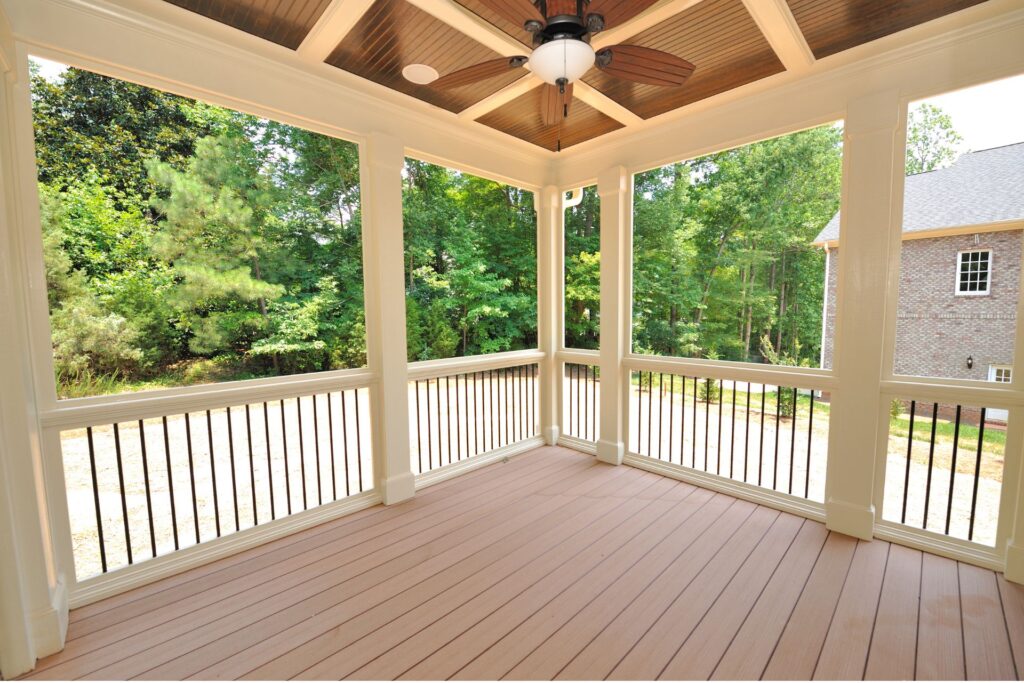
Key Factors Influencing The Cost Of A Deck
In the journey of enhancing your outdoor living space, building a deck stands out as a transformative project. Whether it’s for leisurely evenings, family gatherings, or a quiet morning coffee, a deck adds a new dimension to your home. However, before embarking on this exciting project, understanding the key factors that influence the cost of a deck is crucial. This guide aims to provide you with a comprehensive insight into these aspects, ensuring that you can plan your deck construction with clarity and confidence.
Materials: The Foundation of Your Deck
The choice of decking materials is perhaps the most significant factor affecting the cost of your deck. The market offers a variety of materials, each with its price range and attributes:
Pine: An affordable option for those on a tight budget. However, it requires regular maintenance to resist rot and pests.
Hardwood: Offers durability and a premium look. Hardwoods like teak or ipe are more resistant to the elements but come with a higher price tag.
Composite: Made from wood fibers and plastic, composite decking is a maintenance-free option that mimics the look of real wood. It’s a middle-ground choice in terms of price but offers longevity and ease of care.
Size Matters: Balancing Space and Budget
The size of your deck directly impacts the overall cost. Larger decks require more materials and labor, increasing your budget. When planning, consider how you intend to use the space to determine the optimal size that balances your needs with your financial considerations.
Design Complexity: Creativity vs. Cost
A deck with multiple levels, intricate patterns, railings, or built-in seating will undoubtedly look stunning but also add to the complexity of the project. These design features require additional materials and skilled labor, driving up the cost. Carefully consider which elements are essential for your dream deck and which can be modified to keep within your budget.
Labor Costs: Professional Installation vs. DIY
The decision between hiring professionals or taking on the project yourself can significantly affect your expenses. While DIY can reduce costs, it requires time, tools, and a certain skill level. Professional installation, on the other hand, offers expertise and efficiency but at a higher cost. Evaluate your skills and the complexity of your design before deciding which route to take.
Navigating Permits and Regulations
Before construction begins, it’s vital to understand your local council’s requirements regarding permits and regulations. Compliance is not optional; it ensures safety and avoids future legal complications. The cost and process for obtaining permits can vary, so factor this into your planning phase to avoid unexpected delays and expenses.
Embarking on the construction of a deck is an adventure that promises to enhance the enjoyment of your home. By considering these key factors – materials, size, design complexity, labor costs, and permits – you’re equipped to make informed decisions that align with your vision and budget. With thoughtful planning and execution, your deck will become a cherished outdoor retreat for years to come.
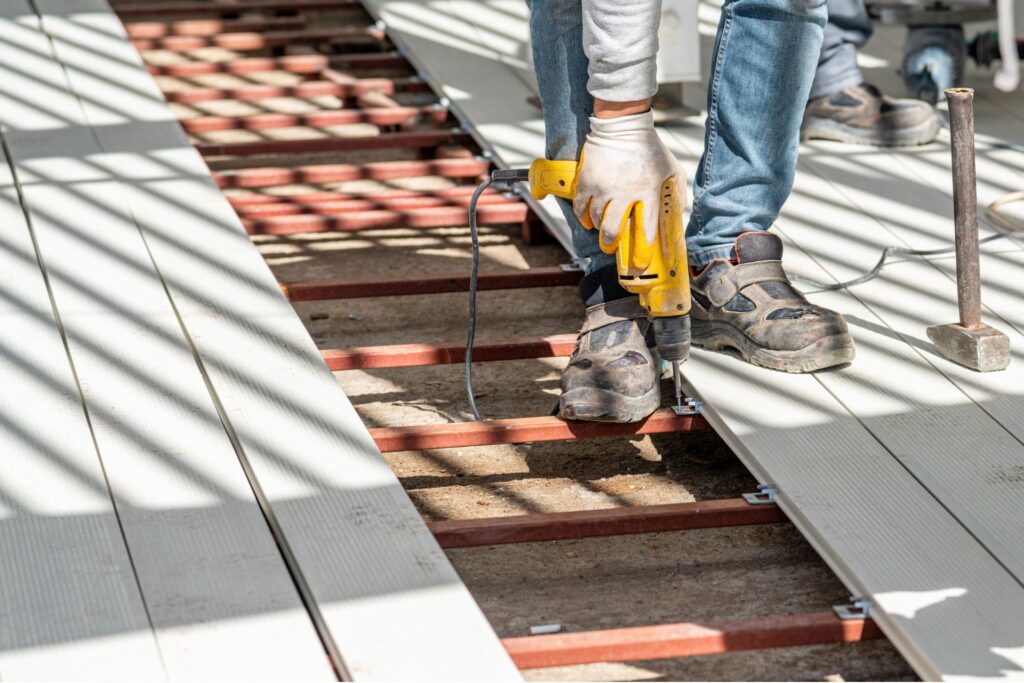
Average Cost Of Decking In NZ
When embarking on a home improvement project like decking in New Zealand, one of the first questions that comes to mind is, “How much is this going to cost me?” Decking can transform your outdoor living space, providing a beautiful and functional area to relax and entertain. However, the cost can vary widely depending on several factors, including the size of the deck and the materials used. In this comprehensive guide, we’ll delve into the average cost of decking projects across New Zealand, segmented by size and material, and provide you with insightful case studies to help you make informed decisions.
Understanding Decking Costs by Size
The size of your deck plays a significant role in determining the overall cost. Generally, we can categorize decking projects into three sizes: small, medium, and large.
Small Decks: Typically less than 10 square meters, small decks are perfect for cozy spaces. The average cost for a small decking project can range from NZ$2,000 to NZ$5,000. These are ideal for townhouses or homes with limited outdoor space.
Medium Decks: Ranging from 10 to 20 square meters, medium-sized decks offer ample space for dining and lounging. The cost for medium decks can vary between NZ$5,000 to NZ$12,000, depending on the materials and design complexities.
Large Decks: For those looking to create an extensive outdoor living area, large decks (over 20 square meters) can cost anywhere from NZ$12,000 to NZ$20,000 or more. Large decks allow for multiple zones, including outdoor kitchens, dining areas, and fire pits.
Decking Material Costs
The choice of material significantly impacts the cost of your decking project. Here’s a breakdown of popular decking materials in New Zealand:
Treated Pine: Known for its affordability and durability when properly maintained, treated pine is a common choice. The average cost for treated pine decking is around NZ$200 to NZ$350 per square meter.
Hardwood: Offering a premium look with higher durability, hardwoods like kwila and vitex are popular but come at a higher cost, averaging NZ$250 to NZ$450 per square meter.
Composite Decking: Made from a blend of wood fibers and plastic, composite decking requires minimal maintenance and does not warp or splinter. The cost for composite decking averages between NZ$350 to NZ$600 per square meter, making it the most expensive option.
Case Studies
To give you a better understanding of how these costs translate into real-life scenarios, let’s consider a couple of hypothetical case studies:
The Smiths’ Medium-Sized Hardwood Deck: The Smith family wanted a durable and stylish deck for their 15 square meter backyard. Opting for kwila hardwood, their project cost was around NZ$8,250, falling in the mid-range of our estimates for medium decks.
Jenny’s Small Composite Deck: Jenny decided on a small 8 square meter deck using composite materials for her urban home. The project cost her NZ$4,800, showcasing the higher material cost but lower overall project cost due to the deck’s size.
When planning your decking project in New Zealand, consider both the size of the deck and the materials you wish to use. By understanding these factors, you can better estimate the cost of your project and make choices that fit your budget and lifestyle. Remember, investing in quality materials and professional installation can extend the life of your deck and enhance your home’s outdoor space for years to come.
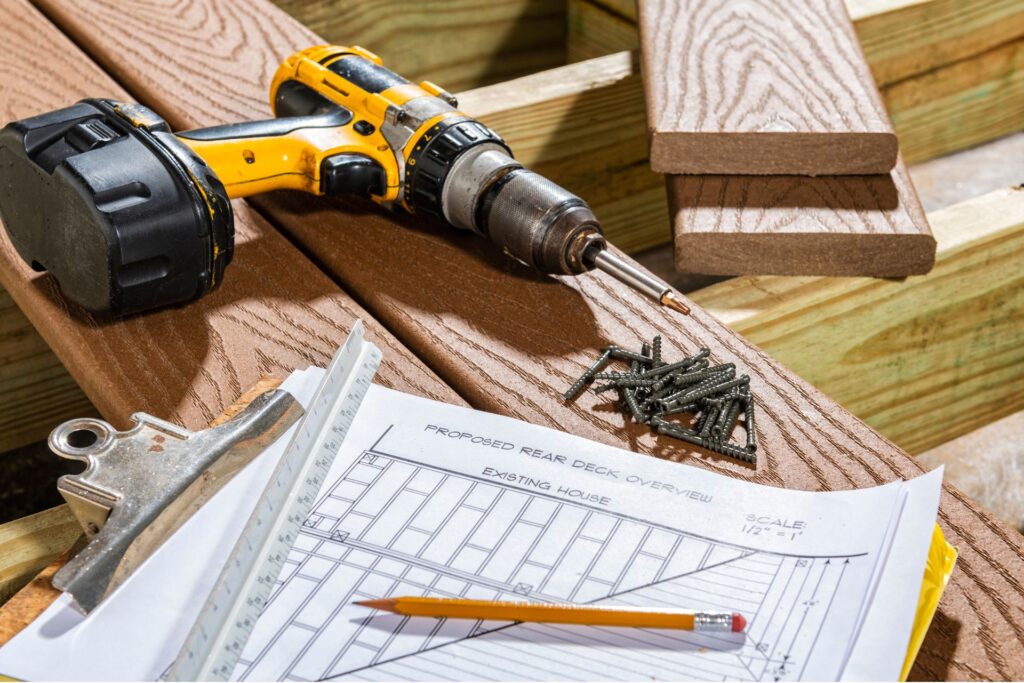
Budgeting For Your Deck Project
Creating the perfect deck for your home is an exciting project, but it’s crucial to start with a clear budget in mind. Without careful planning, costs can escalate quickly, turning your dream deck into a financial burden. In this guide, we’ll walk you through a step-by-step process to set a realistic budget for your deck project. We’ll also uncover some hidden costs you might not have considered and share tips on how to save money without cutting corners on quality.
Step 1: Establish Your Baseline
Start by determining the overall size and design of your deck. The complexity of your design and the materials you choose will significantly impact your budget. Research the average cost per square foot for different materials and designs in your area. This initial step will give you a baseline estimate to work from.
Step 2: Factor in Hidden Costs
Many homeowners overlook hidden costs that can affect the overall budget. Here are some to consider:
Preparation Work: If your yard needs leveling or if you need to remove an old deck or trees, these tasks will add to your costs.
Finishing and Maintenance: Beyond the initial build, consider the cost of staining, sealing, or painting your deck. Additionally, factor in long-term maintenance costs, especially for wood decks that require more upkeep.
Permits and Inspections: Depending on where you live, you may need to obtain building permits, and your deck may need to pass inspections, both of which cost money.
Step 3: Set Aside a Contingency Fund
Unexpected issues can and often do arise during construction projects. It’s wise to allocate an additional 10-20% of your total budget for unforeseen expenses. This contingency fund can save you from stressful financial surprises.
Tips for Saving Money Without Compromising Quality
Compare Material Costs: While exotic woods and high-end composites look fantastic, there are many durable and attractive materials available at a fraction of the cost. Research and compare different materials to find the best value.
Do Some Work Yourself: If you’re handy, consider taking on some of the projects yourself. Even if you’re not comfortable building the deck from scratch, you might save money by doing the preparation work or finishing touches.
Shop Around for Contractors: If you decide to hire professionals, get quotes from several contractors. Look for those with good reputations for delivering quality work at reasonable prices.
Off-Season Deals: Sometimes, you can snag discounts on labor and materials during the off-season when contractors are less busy.
Budgeting for your deck project requires careful planning and consideration of both obvious and hidden costs. By following the steps outlined above, you can set a realistic budget that allows you to build your dream deck without breaking the bank. Remember, a well-planned deck not only enhances your living space but also adds value to your home, making it a worthwhile investment.
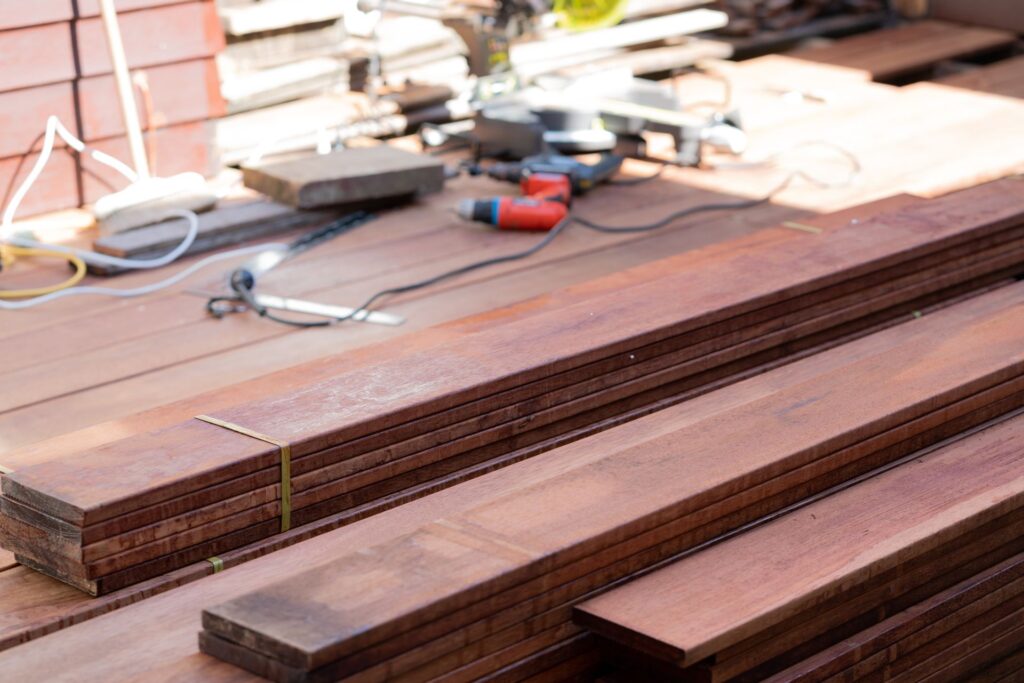
Choosing The Right Materials For Your Budget And Lifestyle
Crafting the perfect outdoor space begins with choosing the right decking materials that align with your budget and lifestyle. In this section, we delve deep into the nuances of selecting decking materials that not only stand the test of time but also enhance your home’s aesthetic appeal without breaking the bank. Our goal is to provide you with a detailed comparison, expert insights, and tailored recommendations to ensure your decking project is both successful and satisfying.
Understanding Decking Materials: A Deep Dive
Decking materials come in a variety of options, each with its unique set of characteristics. The key factors we consider in our comparison include durability, maintenance, aesthetics, and cost, ensuring you have all the information needed to make an informed decision.
Durability: The Longevity of Your Deck
Durability is paramount when selecting decking material. The longevity of your deck depends on the material’s resistance to weather, pests, and daily wear and tear. Traditional wood decking, while popular for its classic look, requires regular treatment to fend off rot and insects. Composite decking, on the other hand, offers a longer lifespan with its combination of wood fibers and plastic, providing resistance to environmental factors without the need for frequent maintenance.
Maintenance: Keeping Your Deck in Top Condition
Maintenance is a crucial aspect that directly impacts the lifecycle and aesthetics of your deck. Wood decks demand annual staining and sealing to maintain their appearance and durability. Composite and PVC decking materials offer a low-maintenance alternative, needing only occasional cleaning to keep them looking new. Understanding the maintenance requirements can significantly influence your choice, especially if you prefer a more set-and-forget approach to your outdoor living space.
Aesthetics: Enhancing Your Home’s Appeal
The appearance of your decking material is a personal choice that adds to the charm of your home. Wood offers a timeless beauty that can complement any architectural style, but it may weather and change color over time. Composite and PVC decking come in a wide range of colors and textures that mimic the look of natural wood without the same aging process, allowing for a consistent appearance over time.
Cost: Balancing Quality with Budget
Budget considerations are essential in the decision-making process. While wood decking may have a lower initial cost, the long-term expenses associated with maintenance can add up. Composite and PVC decking materials, though pricier upfront, may offer savings over time due to their minimal maintenance requirements and longer lifespan.
Expert Recommendations Tailored to Your Needs
Every homeowner’s needs and budgets are unique, and there’s no one-size-fits-all solution. For those prioritizing durability and long-term value, composite decking might be the best investment. Homeowners looking for the natural beauty of wood and are willing to put in the maintenance work might prefer traditional wood decking. If your priority is a low-maintenance solution that still offers aesthetic flexibility, PVC decking could be your best bet.
Choosing the right decking materials requires careful consideration of various factors, including durability, maintenance, aesthetics, and cost. By understanding the pros and cons of each material, you can make a choice that fits your lifestyle and budget. Whether you prefer the natural look of wood or the durability and low maintenance of composite or PVC materials, there’s an option out there that’s perfect for your outdoor space. Our expert recommendations are designed to guide you through this process, ensuring that your decking project not only meets but exceeds your expectations.
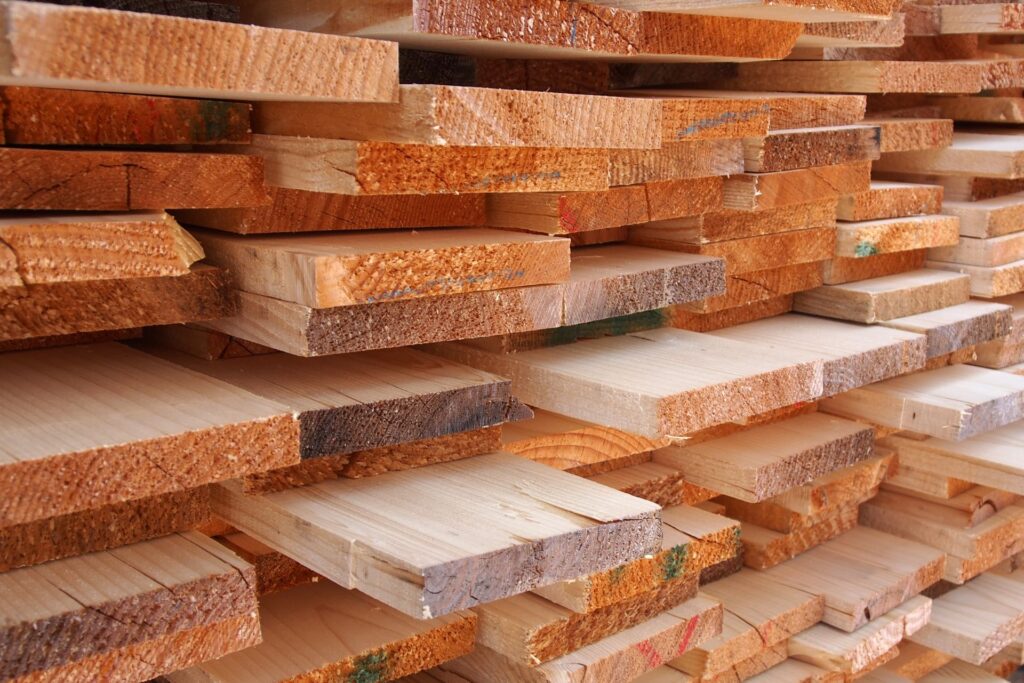
Navigating DIY VS. Professional Deck Installation
When envisioning the perfect outdoor oasis, a deck often takes center stage. It’s where memories are made, from tranquil morning coffees to lively evening gatherings. However, the journey from vision to reality presents a critical fork in the road: should you embark on a DIY deck building adventure or enlist the expertise of professional installers? This decision is pivotal, influencing not only the outcome of your project but also your budget, timeline, and overall satisfaction. In this comprehensive guide, we’ll navigate the pros and cons of DIY versus professional deck installation, helping you make an informed choice that aligns with your skill level, budget, and project complexity.
DIY Deck Building: A Path of Personalization and Pride
Embarking on a DIY deck project is an enticing proposition for the hands-on homeowner. It’s a journey marked by personalization, learning, and the pride of creation. However, like any adventure, it comes with its share of challenges and rewards.
Pros
Cost Savings: The most compelling advantage of DIY deck building is the potential for cost savings. By eliminating labor expenses, you can often allocate more of your budget toward higher-quality materials or additional features.
Flexibility and Control: DIY projects offer unparalleled flexibility. You can work at your own pace, make changes on the fly, and ensure every detail aligns with your vision.
Skill Building and Satisfaction: The learning experience and satisfaction derived from building your deck cannot be overstated. There’s a unique pride in enjoying a space you’ve crafted with your own hands.
Cons
Time and Effort: DIY projects demand a significant investment of time and effort. Without the efficiency of a professional crew, your project might take longer to complete.
Complexity and Mistakes: Deck building involves intricate planning and execution. Mistakes can be costly and time-consuming to rectify, and complex designs may be challenging to achieve without specialized skills.
Permit and Code Compliance: Navigating building codes and obtaining the necessary permits can be daunting. Compliance is crucial to ensure safety and avoid legal issues.
Professional Deck Installation: Expertise and Efficiency
For those who prefer a hands-off approach or face a complex project, professional deck installation offers a blend of expertise, efficiency, and peace of mind.
Pros
Professional Expertise: Professional installers bring a wealth of experience, ensuring that your deck is built safely, efficiently, and to code. Their expertise can also prove invaluable in tackling complex designs and challenges.
Time-Saving: A professional crew can complete the project faster than a solo DIY effort, minimizing disruption to your daily life and allowing you to enjoy your deck sooner.
Warranty and Peace of Mind: Many professional installers offer warranties on their work, providing added peace of mind. Should any issues arise, you have a point of contact for repairs and adjustments.
Cons
Cost: Professional services come with a price tag. Labor costs can significantly increase the overall expense of your deck project.
Less Personal Involvement: Hiring professionals means less hands-on involvement in the building process, which might detract from the personal connection some homeowners seek with their projects.
Scheduling Constraints: You’ll need to work within the installer’s schedule, which may not align perfectly with your timeline or preferred project start date.
Making Your Decision: Aligning with Your Needs
Deciding between DIY and professional deck installation hinges on careful consideration of your skill level, budget, project complexity, and personal preferences. If you’re comfortable with tools, eager for a challenge, and looking to stretch your budget, a DIY approach could be rewarding. However, if your project involves complex features, or if time and quality are your top priorities, professional installation might be the best route.
In making your decision, weigh the satisfaction and potential savings of a DIY project against the expertise, efficiency, and peace of mind that professionals provide. Regardless of the path you choose, planning and preparation are key to bringing your outdoor dream space to life.
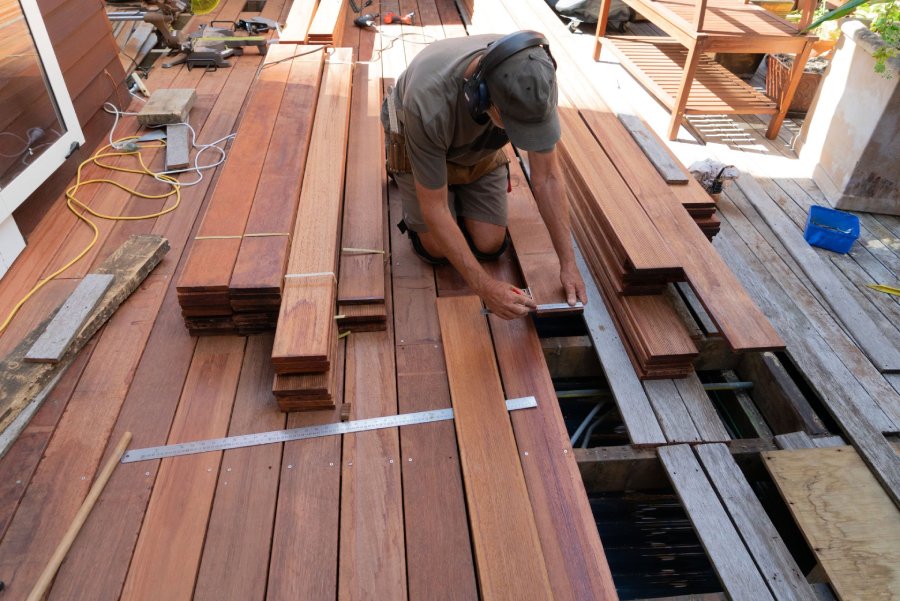
Maximizing Your Deck Investment
In today’s housing market, outdoor living spaces are more than just an aesthetic addition to your home; they are an investment that can significantly increase your home’s value and appeal. A well-maintained and upgraded deck not only provides you with a tranquil outdoor retreat but also boosts your property’s overall marketability. In this section of our comprehensive outdoor living guide focuses on maximizing your deck investment through effective maintenance strategies and cost-effective upgrades. Here’s how you can ensure that your deck remains a valuable and enjoyable part of your home for years to come.
Maintenance Tips to Prolong the Life of Your Deck
Regular Cleaning: Keeping your deck clean is the cornerstone of deck maintenance. Sweep it regularly to remove dirt and debris, and consider a deep clean at least once a year with a deck cleaner suitable for your deck’s material. This not only keeps your deck looking great but also prevents the buildup of materials that can lead to deterioration over time.
Seal and Protect: After cleaning, sealing your deck is crucial. A high-quality sealant can protect against water damage, which is a common cause of wood rot and decay in wooden decks. For composite decks, follow the manufacturer’s recommendations for sealants and protective coatings.
Inspect and Repair: At least once a year, conduct a thorough inspection of your deck. Look for signs of wear and tear, including loose boards, protruding nails, or any signs of rot. Early detection and repair can prevent minor issues from becoming major problems, saving you money and extending the life of your deck.
Sun Protection: If your deck is constantly exposed to direct sunlight, consider applying a UV-protectant finish or installing a pergola or canopy. This can prevent fading and wear from UV exposure, keeping your deck’s appearance vibrant and new.
Upgrades and Additional Features to Enhance Your Deck Experience
Lighting: Adding lighting to your deck can enhance its ambiance and extend its usability into the evening hours. Solar or LED lights are cost-effective options that can be easily installed along railings, stairs, or in seating areas.
Add a Fire Pit: A fire pit can transform your deck into a cozy gathering spot for family and friends. Portable fire pits are affordable and can be a focal point for relaxation and entertainment. Ensure your deck’s material and structure can safely accommodate a fire pit.
Quality Outdoor Furniture: Invest in durable, weather-resistant outdoor furniture that complements your deck’s style. Comfortable seating, outdoor rugs, and cushions can make your deck feel like an extension of your indoor living space.
Planters and Greenery: Incorporating planters with flowers, herbs, or small shrubs can add life and color to your deck. Choose plants that thrive in your climate and can be easily maintained for a lush, inviting outdoor space.
By following these maintenance tips and considering strategic upgrades, you can maximize your deck investment, ensuring it remains a valuable, functional, and enjoyable extension of your home. Whether you’re enjoying a quiet morning coffee or hosting a lively weekend barbecue, your deck can serve as the perfect backdrop for countless memories and moments.
Remember, regular upkeep not only preserves your deck’s condition but also its value, making these efforts well worth the investment. With the right care and enhancements, your deck can be a lasting testament to your home’s charm and your commitment to quality outdoor living.
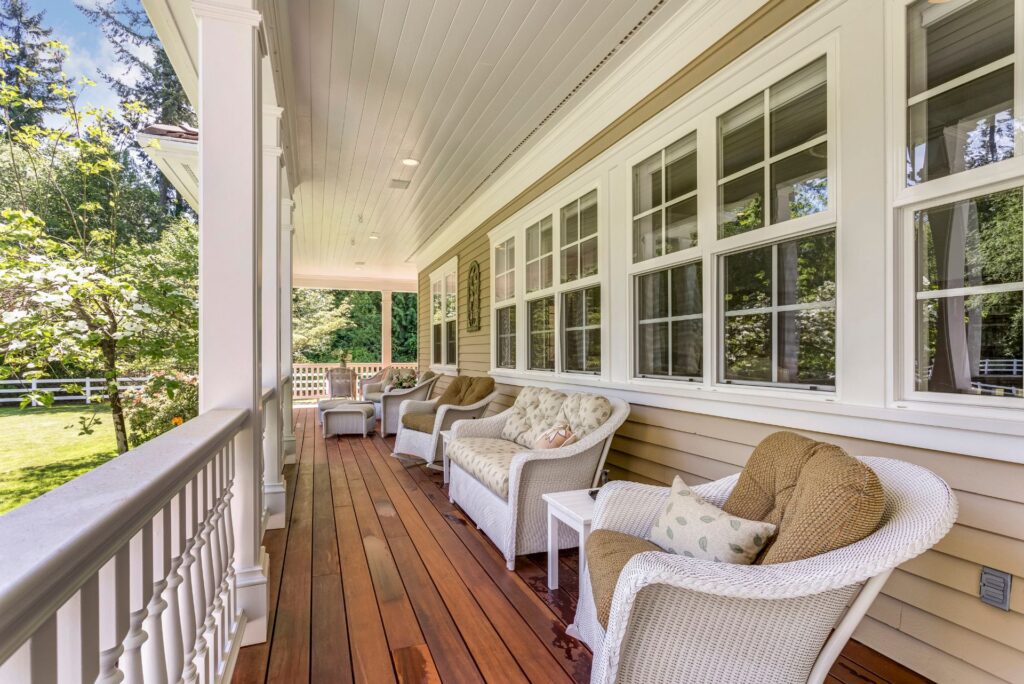
Navigating Permits And Regulations
When embarking on a deck construction project in New Zealand, navigating the maze of permits and regulations is crucial. This guide is designed to simplify the complexities of the regulatory landscape, ensuring your project not only meets local standards but also complies with national requirements, thereby safeguarding the integrity and safety of your deck.
Understanding the Regulatory Landscape
New Zealand’s building regulations are structured to ensure that all construction projects, including decks, meet specific safety, health, and environmental standards. The Building Act 2004 and the Building Code are two key pieces of legislation that outline the requirements for residential and commercial construction work in the country. Navigating these regulations is essential for any homeowner or contractor planning to build a deck.
Why Compliance is Essential
Compliance with local and national standards is not just a legal requirement; it’s a critical step in ensuring the safety and longevity of your deck. Non-compliance can lead to costly penalties, legal issues, and even the dismantling of your project. More importantly, adhering to these standards protects those who use the deck and ensures the structure’s durability and safety over time.
Step-by-Step Guide to Ensuring Compliance
1. Research Local Requirements: Building regulations can vary significantly from one region to another. It’s essential to familiarize yourself with the specific permits and regulations in your local area. Most local council websites offer detailed information on the requirements for deck construction, including the need for permits, height restrictions, and materials specifications.
2. Secure the Necessary Permits: Before starting your deck construction, ensure you have all the required permits. The process typically involves submitting your deck plans for review by local authorities, who will assess them for compliance with the Building Code and local regulations. This step might seem cumbersome, but it is crucial for legal compliance and safety assurance.
3. Consult with Professionals: Engaging with architects, builders, or professional advisers who are familiar with New Zealand’s building regulations can provide valuable insights and help streamline the compliance process. These professionals can assist in designing your deck to meet legal standards and in navigating the permit application process.
4. Regular Inspections: Depending on the scale of your project, you may be required to have the construction inspected at various stages. These inspections are designed to ensure that the work complies with the approved plans and regulations. Ensuring your project passes these inspections is crucial for compliance and for moving forward with your construction.
5. Final Compliance Check: Upon completion of your deck, a final inspection may be necessary to ensure that the construction complies with all relevant regulations and the approved plans. Successfully passing this inspection often leads to the issuance of a Code Compliance Certificate (CCC), confirming that your deck meets all the required standards.
Navigating the permits and regulations for deck construction in New Zealand can be a complex process, but it’s a fundamental step in ensuring your project is safe, compliant, and durable. By understanding the importance of compliance, researching local requirements, securing necessary permits, consulting with professionals, and adhering to inspection protocols, you can ensure your deck project not only meets local standards but also enhances your home’s value and usability. Remember, investing time and effort in compliance from the outset can save you from potential headaches and costs down the line.

FAQs: About How Much Does A Deck Cost In NZ
Conclusion
Concluding our discussion on the costs associated with decking in New Zealand, it’s imperative to remember the significance of meticulous planning and thoughtful deliberation. We’ve journeyed through the multifaceted aspects influencing the financial aspects of decking, underscoring the vitality of not just focusing on the upfront expenses but also valuing the long-term benefits and overall return on investment. Adopting a warm, human tone, we empathize with the fact that budgeting for a deck is a substantial commitment for many. Hence, we encourage a holistic view, considering both the immediate and future rewards of your decking project. By blending relevant keywords with unique insights and suggesting engaging actions, our aim is to not only connect deeply with our readers but also to optimize our content for better online visibility, ensuring it’s both insightful and accessible.
About the Author:
Mike Veail is a recognized digital marketing expert with over 6 years of experience in helping tradespeople and small businesses thrive online. A former quantity surveyor, Mike combines deep industry knowledge with hands-on expertise in SEO and Google Ads. His marketing strategies are tailored to the specific needs of the trades sector, helping businesses increase visibility and generate more leads through proven, ethical methods.
Mike has successfully partnered with numerous companies, establishing a track record of delivering measurable results. His work has been featured across various platforms that showcase his expertise in lead generation and online marketing for the trades sector.
Learn more about Mike's experience and services at https://theleadguy.online or follow him on social media:

